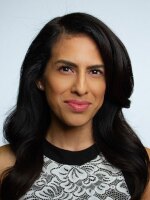Skin cancer is highly treatable, if it’s caught early. But spotting it can be tricky. How it shows up on the skin can look different depending on skin tone. And for people with darker skin, that sometimes means a later diagnosis.
“Sometimes the display of the skin cancer in these individuals are not typical as they are in European ancestries,” said Kelly Frazer, a genome researcher at UC San Diego. “Skin cancer can occur on the bottom of the feet or under the fingernails,” she said.
Frazer and her team wanted to change disparities in skin cancer diagnoses. They wondered if artificial intelligence could help.
“Could we use AI to try to figure out a better predictor as to who has skin cancer, not only in Caucasians, but in non-European ethnicities?” Frazer said.
They analyzed data from more than 400,000 people, using whole genome sequence data — essentially a detailed map of a person’s DNA. The participant data came from the National Institutes of Health's All of Us research program, which has a goal of creating a diverse, large-scale database. That helped them include more people from Black, Hispanic, Asian and mixed-ancestry heritages.
“We've been relying on very old data sets and very old prediction models for decades now,” Frazer said.
They used both genetic and nongenetic factors, including income level, lifestyle and medication use to build an AI model that predicts who’s most likely to develop skin cancer.
“The AI model can say this person has a very high chance of having skin cancer, pull them in for a full-body scan,” Frazer said.
They tested the model on people whose skin cancer status was already known. It predicted skin cancer risk with almost 90% accuracy across different ethnicities, Frazer said.
The goal isn’t to replace a doctor’s screening, but to give them tools to catch cancer sooner, she said.
“This is an area where I think AI is exciting, right?” said Dr. Ben Kelley, a dermatologic surgeon at Scripps Clinic. “Because if we're not seeing a lot of it, we're maybe not used to seeing the variations that they come with clinically. AI can provide a platform for us to be able to identify these patients who are at risk.”
This kind of technology could help make skin cancer screening more equitable, Kelley said.
“I think the more of these models that come out, the more it will become apparent how to incorporate AI into the clinic,” Frazer said.
It’s one example of how AI can detect diseases earlier, starting with skin cancer, she said.








